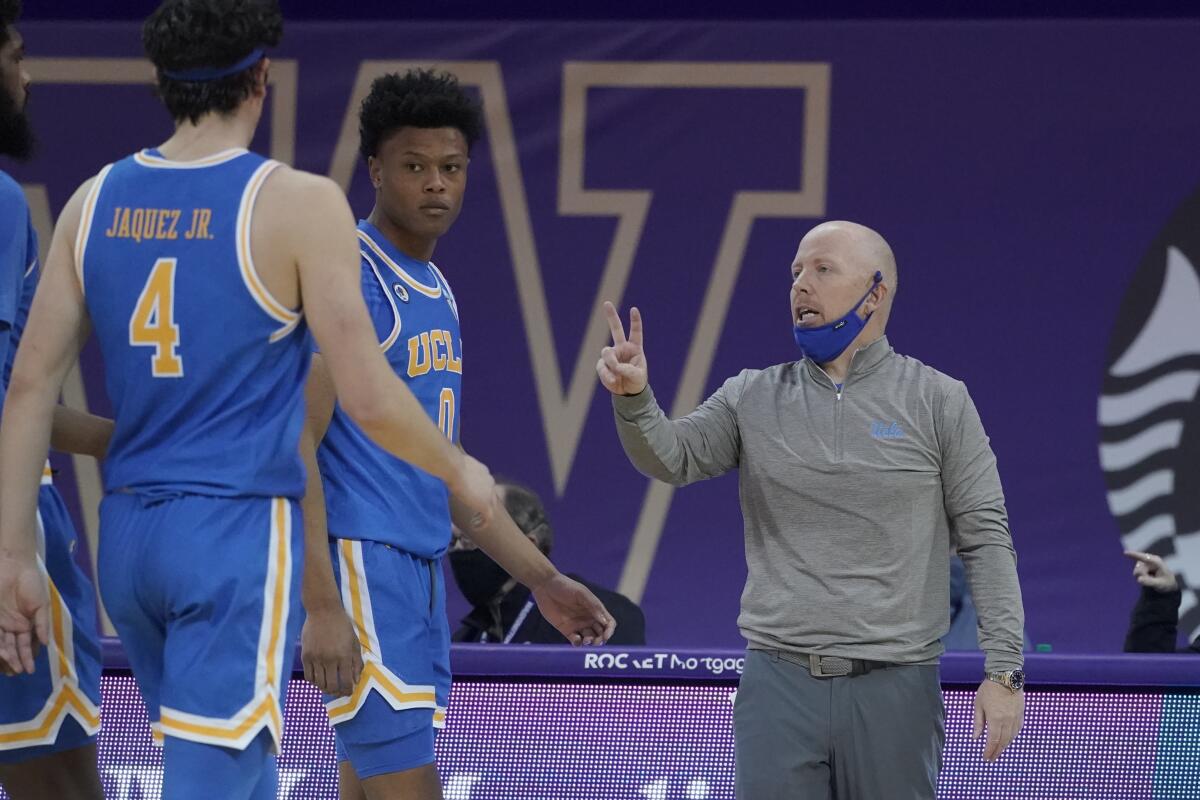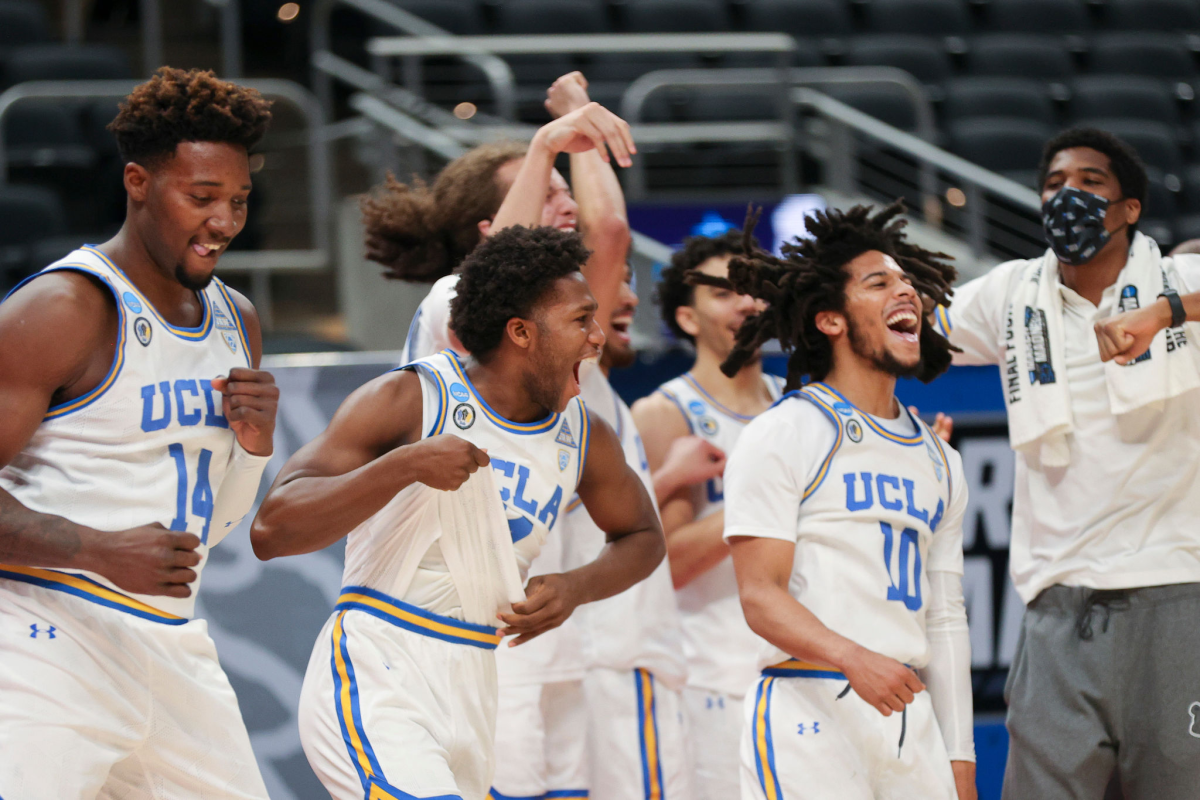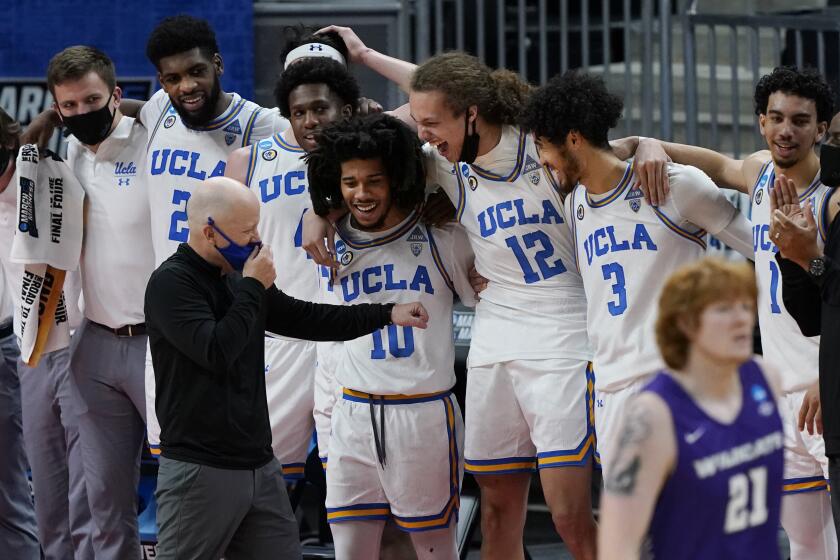UCLA’s early success under Mick Cronin is a developing situation thanks to its coach

- Share via
INDIANAPOLIS — Sometimes, before you can make others soar, you’ve got to get knocked on your butt.
That was where Mick Cronin found himself, tumbling onto his backside at Long Beach City College some 30 years ago while helping player development guru Tim Grgurich work out a promising young point guard from the Seattle SuperSonics.
“Gary Payton didn’t know who the hell I was,” Cronin recalled recently with a laugh of a player who would go on to be inducted into the Naismith Memorial Basketball Hall of Fame.
Cronin’s assignment, back in the days when he was a high school coach with a full head of hair and a summer side job, was to guard Payton coming off screens. That involved grabbing him, holding him, doing whatever he could to make things as difficult as possible.
UCLA coach Mick Cronin has helped transform the Bruins into a Sweet 16 team. What else can he and his talented roster of players accomplish this weekend?
Payton was hardly deterred, fighting through the contact and sending his far less athletic counterpart onto his rear. A year later, after girding himself for the challenge through intense workouts, Cronin was able to better contest Payton, grabbing him without getting toppled.
It was the start of three decades’ worth of player enhancement that has served as Cronin’s specialty, first as an assistant to Bob Huggins and Rick Pitino and later running his own programs at Cincinnati and UCLA, where the 49-year-old who has lost all his hair as well as a few steps doesn’t endanger himself defending screens as much anymore.
Cronin has guided the 11th-seeded Bruins (20-9) to an NCAA tournament regional semifinal in only his second season in large part because he’s maximized a roster missing top players Chris Smith and Jalen Hill, not to mention the infusion of high-end talent that’s expected to arrive next season.
“You’re only going to be as good as your players,” said Cronin, whose team will face second-seeded Alabama (26-6) on Sunday at Hinkle Fieldhouse. “As a staff, we needed to show them the way. They were young and they didn’t know how hard it was going to be, but they’ve been willing to put in the work because they want to be winners, they know the legacy they’re trying to live up to at UCLA.”
These Bruins are spawning a legion of admirers among their predecessors, getting better every day that Cronin and assistants Darren Savino, Rod Palmer and Michael Lewis spend with them. One year after Smith was selected as the most improved player in the Pac-12, forward Cody Riley and guard Jules Bernard have vastly enhanced their play.
Guard Johnny Juzang has gone from a bit player at Kentucky to one of the stars of the NCAA tournament, albeit in a far bigger role than he enjoyed with the Wildcats.
Juzang, who averaged 22.3 points during victories over Michigan State, Brigham Young and Abilene Christian, said Cronin’s teaching ability was one of the things that made him pick the Bruins after entering the transfer portal. Cronin has pushed Juzang to be a better rebounder, more disruptive on defense and draw more contact so that he can capitalize on being a 90.7% free-throw shooter.
“Something I appreciate so much with this coaching staff and coach Cronin is they want you to be the best player you can be,” Juzang said, “and they take the time to teach you and to give you the opportunities to do that as long as you work hard and you listen and do what they’re telling you.”

It’s not always easy hearing what Cronin has to say. While at Cincinnati, he once instructed an assistant to tell Gary Clark, then one of the most highly sought-after high school players in North Carolina, that he wasn’t playing hard enough, that he should be seeking a triple-double in every game.
“I just kind of took it as like, ‘What do you mean I’m not playing hard enough? I’m dominating,’ ” Clark remembered. “And I went on to take an edge out of it, it put a chip on my shoulder and I just kind of dominated more and took my game to another level.”
Clark continued that trajectory under Cronin at Cincinnati, perfecting his hook shot and developing a three-pointer. As a senior, he was the player of the year in the American Athletic Conference and went on to sign with the Houston Rockets as an undrafted free agent.
There were similar success stories involving Sean Kilpatrick, a lightly regarded high school prospect who became an All-American, and Jacob Evans, who was later drafted in the first round by the Golden State Warriors.
“Our way to getting a great player was developing him,” Cronin said, “not recruiting him.”
That shouldn’t be an issue soon at UCLA considering Cronin has scored the top high school player in California in each of his next two recruiting classes, but the current roster is devoid of a McDonald’s All-American for a second consecutive year (and the only two years in program history since the inception of the award).
Cronin and his assistants have made the Bruins immediate winners by making the most of the talent they inherited. Riley has become a reliable low-post scorer after working with Savino, the Bruins’ big-man specialist, on slowing down and using his size and strength to his advantage.
“The guy that takes his time, the guy that’s not in a rush,” Savino said, “usually is the most effective post player.”
Savino developed Riley’s interior moves not only on the court but also in lengthy film sessions, showing him footage of how such other Pac-12 players as Stanford’s Oscar da Silva could be crafty with a duck-in and a post-up. Cronin and Savino, who had worked together at Cincinnati before coming to UCLA, also spliced in film of former Bearcats players doing various things they want the Bruins to learn.
Among Cronin’s development mantras is play to strengths, develop weaknesses. Riley’s 15-foot jumper has become one of the most consistent among power forwards in college basketball and he’s boosted his free-throw accuracy from 52.3% as a freshman to 67% this season after working with Lewis on his approach at the line.
Sometimes failure can be the best motivator. After many forays into the lane that resulted in a turnover or a blocked shot, Bernard realized that what had worked in high school against lesser defenders was not going to be successful in major college basketball.
Local AAU basketball team, the Compton Magic, was once home for five players who are still playing in the NCAA tournament.
Coaches helped him diversify his attack by either creating space for an open shot or driving to draw contact or make a layup unless the help defense leads to him find an open teammate. Bernard has nearly doubled his scoring output in one season, averaging 10.4 points as a junior after having averaged 5.5 as a sophomore.
Cronin sharpens his player’s mental makeup as well as their jumpers, telling point guard Tyger Campbell that he needs to be aggressive at all times, looking to score in double figures every game. His advice to guard Jaime Jaquez Jr. is to always want it more than anybody else.
“Jaime Jaquez, you’re trying to become a pro someday and there’s a guy your age in Lithuania that’s working out every day, he’s the same size as you,” Cronin said. “Who’s going to get better and get that spot — you or him?”
Thanks to the coach constantly nudging him forward, demanding his best, Jaquez might have a considerable head start.
More to Read
Go beyond the scoreboard
Get the latest on L.A.'s teams in the daily Sports Report newsletter.
You may occasionally receive promotional content from the Los Angeles Times.








